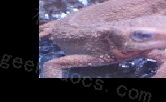仿射变换,又称仿射映射,是指在几何中,一个向量空间进行一次线性变换并接上一个平移,变换为另一个向量空间.
如何进行放大缩小?
1. 使用仿射变换,将图片在x方向上放大1.3倍,在y方向上缩小至原来的\frac{4}{5}。
2. 在上面的条件下,同时在x方向上向右平移30(+30),在y方向上向上平移30(-30)。
python实现:
import cv2
import numpy as np
import matplotlib.pyplot as plt
# Affine
def affine(img, a, b, c, d, tx, ty):
H, W, C = img.shape
# temporary image
img = np.zeros((H+2, W+2, C), dtype=np.float32)
img[1:H+1, 1:W+1] = _img
# get new image shape
H_new = np.round(H * d).astype(np.int)
W_new = np.round(W * a).astype(np.int)
out = np.zeros((H_new+1, W_new+1, C), dtype=np.float32)
# get position of new image
x_new = np.tile(np.arange(W_new), (H_new, 1))
y_new = np.arange(H_new).repeat(W_new).reshape(H_new, -1)
# get position of original image by affine
adbc = a * d - b * c
x = np.round((d * x_new - b * y_new) / adbc).astype(np.int) - tx + 1
y = np.round((-c * x_new + a * y_new) / adbc).astype(np.int) - ty + 1
x = np.minimum(np.maximum(x, 0), W+1).astype(np.int)
y = np.minimum(np.maximum(y, 0), H+1).astype(np.int)
# assgin pixcel to new image
out[y_new, x_new] = img[y, x]
out = out[:H_new, :W_new]
out = out.astype(np.uint8)
return out
# Read image
_img = cv2.imread("imori.jpg").astype(np.float32)
# Affine
out = affine(img, a=1.3, b=0, c=0, d=0.8, tx=30, ty=-30)
# Save result
cv2.imshow("result", out)
cv2.waitKey(0)
cv2.imwrite("out.jpg", out)
c++实现:
#include <opencv2/core.hpp>
#include <opencv2/highgui.hpp>
#include <iostream>
#include <math.h>
// affine
cv::Mat affine(cv::Mat img, double a, double b, double c, double d, double tx, double ty){
// get height and width
int width = img.cols;
int height = img.rows;
int channel = img.channels();
// get detriment
double det = a * d - b * c;
// Resize width and height
int resized_width = (int)(width * a);
int resized_height = (int)(height * d);
// other parameters
int x_before, y_before;
double dx, dy, wx, wy, w_sum;
double val;
int _x, _y;
// output
cv::Mat out = cv::Mat::zeros(resized_height, resized_width, CV_8UC3);
// Affine transformation
for (int y = 0; y < resized_height; y++){
for (int x = 0; x < resized_width; x++){
// get original position x
x_before = (int)((d * x - b * y) / det - tx);
if ((x_before < 0) || (x_before >= width)){
continue;
}
// get original position y
y_before = (int)((-c * x + a * y) / det - ty);
if ((y_before < 0) || (y_before >= height)){
continue;
}
// assign pixel to new position
for (int c = 0; c < channel; c++){
out.at<cv::Vec3b>(y, x)[c] = img.at<cv::Vec3b>(y_before, x_before)[c];
}
}
}
return out;
}
int main(int argc, const char* argv[]){
// read image
cv::Mat img = cv::imread("imori.jpg", cv::IMREAD_COLOR);
// affine
cv::Mat out = affine(img, 1.3, 0, 0, 0.8, 30, -30);
//cv::imwrite("out.jpg", out);
cv::imshow("answer", out);
cv::waitKey(0);
cv::destroyAllWindows();
return 0;
}
输入:

输出1:

输出2:

 极客教程
极客教程